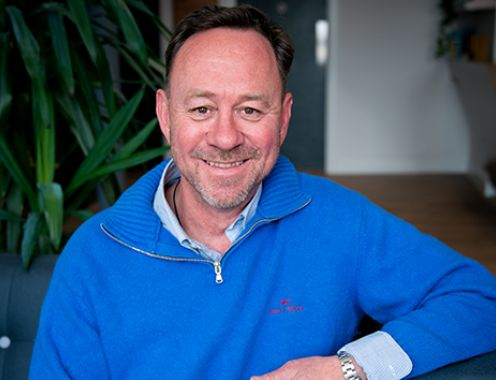- Jobs
- Candidates
- Candidates
- Candidate Services
- Candidate Testimonials
- Employers
- Employers
- Employer Services
- Client Testimonials
- Specialisms
- Executive Interviews
- Podcast
- News & Insights
- News & Insights
- News & Insights
- Events
- About
- Login / Register
Social
EMEA Recruitment Welcomes Michelle Ewing to the Board of Directors

It is with great pleasure that we welcome our Netherlands Country Director, Michelle Ewing, to the board of EMEA Recruitment as she becomes a shareholder and owner.
We are proud to welcome another female board member to EMEA Recruitment, at a time when Diversity & Inclusion is becoming an increased focus for the business.
In 2020, Michelle led our Netherlands team to continue offering a bespoke recruitment service to the changing needs of our clients. She also oversaw the launch of our Procurement & Supply Chain division in the Dutch market, as well as hiring Katie Insley, an Associate Director, in our HR team in the Netherlands.
Michelle’s support also saw the promotion of two other members of our Dutch Finance & Accountancy division: Hannah Mallia to Director – Finance, and Jenny Callum to Associate Director.
Prior to her success in our Netherlands team, Michelle managed our Switzerland Finance & Accountancy team. She has always remained a hands-on recruiter, and is a specialist head hunter for middle, executive and senior level Finance roles.
Michelle has over 16 years’ experience in recruitment and will celebrate her 7-year work anniversary with EMEA Recruitment later this year. Michelle has an extensive professional network, which she continues to expand through her involvement in our events and Executive Interviews.
Richard Bailey, our Managing Director, is proud to welcome Michelle to the board: “EMEA Recruitment has grown significantly since Michelle’s arrival; much of our growth stems from her energy and positive attitude towards exceeding expectations for all candidates and clients.
“Our team have her full support and it’s great to welcome Michelle to the board, as we continue to plan further growth.”
We congratulate Michelle on her latest success, and look forward to many more years of her expertise and guidance.
More insights

Strategic Hiring Leads the Way in a Cautious Q1 HR Market
Although the market for HR professionals in the Netherlands remained cautious in quarter one, strategic hiring drove the market with a number of critical skillsets in demand.
As the financial year ends, professionals begin considering new career opportunities, making April and May particularly busy months.
While companies have been cautious, due to macroeconomic factors, an increase in Talent Acquisition requirements suggests that they are beginning to hire again.
Growth in Technology & Transformation roles, particularly those related to AI, is also expected to continue.
Meanwhile, more organizations are relocating roles to lower-cost regions. While transactional roles have traditionally been affected, higher-skilled positions are now being moved.
The Return-to-Office Debate
The return-to-office debate intensified in quarter one, with more companies issuing blanket return-to-work statements.
A shift toward more in-office presence continued, with many organizations moving to a four days in the office, one day from home model. Conversations shifted from work-life balance to work-life integration, which we anticipate will continue to evolve.
Within the HR team, leaders are telling us that togetherness and spontaneous interactions are increasingly valued, where gauging company sentiment and fostering a strong workplace culture is essential. Building a digital culture and infrastructure is also becoming more of a growing trend in the Dutch market.
Shifting Skillsets
While AI and data-driven roles remain a key topic, businesses are still in the early stages of their technology journeys. Companies are working to understand how they can best leverage AI, and while this will be a long-term trend, it has yet to fully take off.
To best support those in our network trying to manage these shifts, we have strengthened our partnerships with HR leaders, particularly those new to their roles, over the past quarter. It often takes around three months for HR Directors to assess an organization’s success, and we have been actively supporting them in their transition by providing market insights and staying abreast of the latest trends.
As we move progess into the next quarter, we remain committed to supporting our network with insights, guidance, and career opportunities. If you’d like to discuss hiring trends or explore new opportunities, please don’t hesitate to reach out to Katie Insley, Director in our HR recruitment team in the Netherlands.

Switzerland: Why Strategic Hiring is Key in HR
Over the past three months, our recruitment teams in Switzerland saw positive signs of economic recovery in Switzerland, with job vacancies on the rise. Our Swiss Country Director, John Byrne, dives into the details...
Confidence heading into the New Year marked a positive start to 2025. For instance, we’ve seen several major transformation projects move forward and a strong commitment to hiring key strategic roles. Obviously, the tariff challenges in April do add some uncertainty, but reflecting on the past three months, the market has responded well in 2025.
Key Trends
Human Resources is becoming increasingly strategic as digitalization and AI take on much of the groundwork in data gathering and administration. As a result, businesses are shifting HR away from operational tasks and focusing more on business partnering and delivering actionable analytical insights, even at junior levels. Professionals with such skills remain in high demand.
The high volume of vacancies mirrors trends seen post-pandemic. The October to December period indicated a market low, with hiring activity picking up in the New Year.
We’ve also observed a growing demand for office-based flexibility. This discussion will remain a strong talking point throughout 2025 and beyond, as enforcing strict return-to-office policies may make it difficult to attract top talent, especially in tougher markets.
Stay Ahead
The coming quarter should see more companies making decisive recruitment moves. Many organizations are looking to commit to senior hires before the summer, presenting opportunities for professionals seeking leadership roles.
Where hundreds of applicants may be pitching for the same role, a strategic approach is key for job seekers. Leveraging your network can open doors and create opportunities beyond standard applications.
If you’d like to discuss hiring trends or explore new opportunities, please don’t hesitate to contact me at john.byrne@emearecruitment.com or our Swiss recruitment team at +41 41 508 7007

Market Trends: Inside Shared Service Center Recruitment
With years of experience recruiting for global businesses all over Europe, our Shared Service Center recruitment specialists support organizations setting up operations in a new country or scaling their existing teams across the world.
Maciej Juszczyński and Lidia Zawistowska are Recruitment Consultants in our office in Wrocław, a major Shared Service Center hub in Poland.
“It’s a city that’s always alive,” says Maciej. As one of the biggest student and SSC cities in Poland, there are lots of opportunities for professional development, as well as many cultural and sporting events.
With good commuter links and proximity to Germany, Wrocław has “a real international vibe,” says Lidia, but isn’t as big as major cities such as Warsaw or London.
The importance of communication
Before joining EMEA Recruitment, both Maciej and Lidia worked in employment markets across Europe, including Romania, Croatia, Denmark, Spain, and the UK. Lidia’s knowledge of different communication styles helps her understand the needs of multi-cultural organizations.
“Even in a Shared Service Center, the personal part is still important,” she explains.
Maciej himself once worked on a recruitment process outsourcing basis for a large Shared Service Center in Poland, which taught him how these operations work. “Every position and company I’ve worked for have given me knowledge that I can use today,” he says.
An employers’ market
Over their careers, Maciej and Lidia have seen significant shifts in the employment market.
“Poland was always an employees’ market; candidates would be in three processes at one time, receive three offers, and employers had to fight for the best talent,” Maciej explains. “Now, it’s the opposite. Employers have become fussy again; they know that candidates need opportunities.”
Lidia has also seen companies putting more energy into finding the right people. At the same time, “people are more careful when changing jobs,” she says. For example, job seekers may want to research the financial situation of the business and ask questions around why they’re hiring.
Shared Service Center culture
Hiring into a Shared Service Center does present its own set of challenges.
Lidia explains: “When recruiting for a business’ head office, you need to understand the culture of the company to make a good match. But when recruiting for a Shared Service Center, you also need to understand the specific culture of the SSC.”
Despite often requiring large volumes of candidates at any one time, Shared Service Center recruitment also needs a personal touch to find the right fit. With multi-cultural stakeholders and various timezones to consider, Lidia brings her experience of working in global markets to find the ideal candidate profile.
“For example, I recruited for a company that was headquartered in the Netherlands, but I was searching for people to be based in the Polish office, who would be reporting to a Finance Director in the Nordics,” she explains. “I understand how Nordic people communicate and what’s most important to them.”
Maciej always tries to be himself when working with job seekers and employers, so that he can be open and manage their expectations. Lidia agrees: “When I’m transparent, candidates understand that we’re not like other agencies.”
Shared Services of the future
So, what does the future of the global Shared Services model look like?
“The focus is moving towards quality over cost,” observes Maciej. He references businesses like Heineken and Ecolab moving their operations to Krakow.
Lidia is curious as to how AI will change our way of working. For instance, we’re increasingly seeing automation in financial reporting, or the use of chatbots in employee services. With so much to learn and adapt to, she advises job seekers to “be ready for changes to their responsibilities”.
“New employees are increasingly responsible for introducing change, such as new tools,” she adds.
It’s a sentiment mirrored by Matt Foster, who leads our Shared Services recruitment team, when he recently reflected on his 20-year career in the SSC sector.
If you’re looking to learn more about trends in the Shared Service Center market, please get in touch with Matt, who will put you in touch with the right specialist: matt.foster@emearecruitment.com

Why Hiring HR Professionals is like Pairing Cheese and Wine
With over 20 years’ experience leading HR teams across diverse industries in Europe, Armand Sohet has hired many HR professionals. Here’s why he compares it to pairing cheese and wine…
Armand Sohet is the Chief Sustainability, HR and Communications Officer at AkzoNobel in Amsterdam. His experience ranges the automotive, pharmaceutical, software, defence, and energy sectors.
“A question people very often ask me is: What is it about recruiting and assessing HR people?” Armand says.
Pairing cheese and wine
An image came to him while presenting to a Swiss-German audience – it’s like pairing cheese and wine.
“Imagine you buy a fabulous bottle of Petrus or Cheval Blanc - a very expensive, €1,000 bottle. You’re thrilled, thinking, this is going to be an experience of a lifetime! So, you grab a camembert (because it’s French and it feels like the right pairing for a fine French wine), but then you try them together, and - let’s be honest - it’s terrible. You wouldn’t admit it, of course, because it’s such an expensive bottle, so you convince yourself it’s good.
“But it’s awful, because the lactic acid in the camembert will always clash with the Cabernet Sauvignon or Merlot in the wine, leaving a metallic taste that’s just unpleasant. I tested this with people who didn’t believe me, and they agreed. So, I said, “Instead of spending €1,000 on this wine, why not just get a €7 bottle of cider to go with the camembert, or maybe a ten or 15-year-old champagne? The bubbles in the champagne will help balance the lactic acid, and it’ll actually be a great experience.”
How does this apply to HR professionals?
In his personal life, Armand enjoys finding the perfect wine and cheese combination, but it’s much harder to find the best match between people and a company, he believes.
“Imagine the cheese is your company and the wine is the person you’ve brought into it,” Armand explains. “You’ve hired the bottle of wine, because it’s prestigious and expensive, but it doesn’t fit. It’s not necessarily a good match, even if it costs a lot.”
So, what is he looking for in his team?
“Sometimes, people are like Swiss wines – a red that goes well with nearly anything,” he shares. “They don’t always stand out as the best, but they fit in well with a lot of different settings.”
Whether you’re looking for a Petrus or a Sauvignon blanc, our HR recruitment specialists are committed to finding the perfect match for your team.
From large-scale restructuring to building teams from scratch, EMEA Recruitment has experts with a wealth of experience in HR who can help – get in touch through our website: https://www.emearecruitment.com/pages/human-resources
Armand spoke to Katie Insley, Director in our HR recruitment division, as part of our Executive Interviews series in April 2025.

Insights from 20 Years in Shared Service Center Recruitment
Matt Foster, Associate Director, has specialized in Shared Service Center recruitment for over 20 years, with experience across Central Eastern Europe.
He explains what excites him about the market, how he expects Shared Service Centers to evolve in the future, and the unique experience of living in Budapest.
What inspired you to specialize in Shared Service Center recruitment?
While living and working in Budapest, I set up a new Shared Service Center team to serve multi-lingual needs. Whether it was a Finance or IT role, the multi-lingual aspect was more important than technical skills. We had lots of inbound calls; it was client driven, like most good specialisms.
People becoming what I call career SSC employees was a new phenomenon. They were moving from one Shared Service Center to the other, moving up the hierarchy.
It also satisfied my need of providing not just people, but imaginative, creative recruitment solutions. Shared Service Center recruitment isn’t a transactional occurrence; it’s not uncommon to face the challenge of sourcing a high volume of multi-lingual talent into a small, sometimes remote, location.
For example, I worked in tandem with clients to solve the problem of getting 30 languages into a small village in northeastern Hungary. Beyond having a dedicated team and conducing continuous research, we liaised with local universities and their Language departments to spread the word. They promoted the opportunities by emailing students and advertising on their physical and virtual job boards.
We also utilized references and referrals, for instance, if a student spoke Dutch, we’d ask them who else in the class speaks Dutch…
How has the global Shared Services market evolved over the past 20 years?
Unrecognizably. The Shared Service Center model began as a way to save money; putting your shared services into one center was the number one driver to save money. Looking for a low-cost location was a secondary by-product; you’d decided to create a Shared Service Center, so you chose a cheap country.
There is now a focus on digitization and service levels with Shared Service Centers – specifically, how to reduce the gap in service quality that customers may perceive. There’s also been growth in the type of functions that you can outsource to an SSC. 20 years ago, strategic functions would not have been considered. Now, you have people with 20 years’ experience working in SSCs rising to high levels in the organization. I’m sure senior SSC managers will be on the boards of FTSE companies in the future.
I’ve seen the whole lifecycle – SSCs are now relocating back to expensive countries to satisfy the ever-increasing desire for quality over cost. There’s a perceived service level relative to the cost of operating in each country. Think of it as tiers of quality versus cost. For example, India tends to be at the lower end, Central and Eastern Europe (CEE) in the middle, and Western countries at the top. There’s a perceived value of customer satisfaction closer to the top, which is the result of a higher educated workforce, and better alignment with the languages spoken in non-SSC departments and divisions.
Timezones play a role, too. It’s the reason why Vodaphone has a Shared Service Center in Newbury and not New Delhi. Companies have to find that balance.
How do you expect the Shared Service Center market to evolve in the future?
With the move towards working from home, the traditional model has had to evolve over the last few years. Maybe we’ll see virtual SSCs, or they might move to town centers in the future.
My personal experience is in Central Eastern Europe, but India and Central America are large markets. What they all have in common is that governments have actively pursued tax incentives for multi-national organizations to set up offices there.
We could see even less developed countries pitching themselves as players in the SSC market. With so many digital nomads disrupting the traditional way of working, maybe island nations, such as in the Pacific Islands, could be on the rise.
I’m also looking forward to how SSCs will adopt AI in beneficial way.
Why did you move to Budapest specifically?
I decided my career was going to involve international business a long time ago.
I was the Country Manager of an online job board in Prague. The CEO asked if I wanted to do the same in Hungary – I didn’t even know where it was!
My degree was in International Business & French, so I was excited to use my languages and learn Hungarian. Hungary joined the EU while I was there, but it still felt like the wild east.
It was great to network with other expats, and had an emerging economy and market. We could introduce proven western techniques very quickly and work across the rest of Eastern Europe from there.
After a year, I was given ten more countries to look after. Recruiting in Central Eastern Europe gave me a lot more than a very stale UK market and economy.
What did you enjoy about living in Budapest?
I networked with like-minded people and met CEOs of FTSE 100 organizations, as well as being invited to Queen Elizabeth II’s birthday party.
I learned a lot and challenged myself. I was exposed to different cultures and languages, so I made loads of cultural mistakes; I declined vodka at breakfast with a CEO in Tallinn and the meeting ended suddenly…
I made mini mistakes daily, but these resulted in real cultural improvements in my professional working abilities.
What are you excited about in the world of SSC recruitment?
Everything. Mostly our position; we get seats at the top table in organizations looking at new countries to set up in.
We make a big difference to people’s lives. People I placed 20 years ago are now in senior positions in Shared Service Centers, so it’s incredibly satisfying. The depth of our connections across this sector is of huge value to our clients and candidates.
If you’re setting up a new Shared Service Center or are expanding your SSC team, Matt can support you with strategic talent acquisition processes and an active database around the world.
Get in touch with him today: matt.foster@emearecruitment.com

Finance Recruitment in Switzerland: Technical Skillsets in High Demand
Jenny Callum, Manager of our Swiss Finance & Accounting recruitment team, reviews the recruitment market in Switzerland...
As we predicted in January, economic growth remained steady in Switzerland over quarter one, with particular progress in the manufacturing, retail, electrical engineering, and logistics industries.
With growing pressure on Switzerland's businesses to drive growth, hiring managers were looking for a more streamlined and efficient hiring process in order to source the right talent to take the business forward.
As a result, there has been growing demand for video shortlists prior to interview, as hiring managers seek to judge softer skills earlier in the hiring process to ensure the right personality fit.
This is saving businesses time and money, and ensures personal and technical skills can be fully evaluated before taking candidates forward to meet the business.
Niche Skillsets in Demand
Tougher market conditions are also driving demand for hybrid skillsets. For example, demand for Financial Controllers with cross-functional business partnering experience remains, while Accountants with Power BI expertise are highly sought-after – especially those with industry-specific skillsets in logistics, audit, and the Big 4.
In response, we witnessed a rising trend in candidates taking the initiative to upskill in Data Science, with increasing interest in machine learning and AI.
There is a growing curiosity about the level of technical expertise required for senior Finance roles: Should leaders have direct knowledge, or is it acceptable to manage those with specialized skills?
As businesses navigate workforce changes and look to prepare for the future, detailed market insights are becoming more important than ever, so if you’d like to discuss what’s happening in your industry and with your competitors, let’s arrange a time to chat. Or if you’d like to explore new opportunities yourself, please don’t hesitate to get in touch with me at jenny.callum@emearecruitment.com

Strategic Hiring Leads the Way in a Cautious Q1 HR Market
Although the market for HR professionals in the Netherlands remained cautious in quarter one, strategic hiring drove the market with a number of critical skillsets in demand.
As the financial year ends, professionals begin considering new career opportunities, making April and May particularly busy months.
While companies have been cautious, due to macroeconomic factors, an increase in Talent Acquisition requirements suggests that they are beginning to hire again.
Growth in Technology & Transformation roles, particularly those related to AI, is also expected to continue.
Meanwhile, more organizations are relocating roles to lower-cost regions. While transactional roles have traditionally been affected, higher-skilled positions are now being moved.
The Return-to-Office Debate
The return-to-office debate intensified in quarter one, with more companies issuing blanket return-to-work statements.
A shift toward more in-office presence continued, with many organizations moving to a four days in the office, one day from home model. Conversations shifted from work-life balance to work-life integration, which we anticipate will continue to evolve.
Within the HR team, leaders are telling us that togetherness and spontaneous interactions are increasingly valued, where gauging company sentiment and fostering a strong workplace culture is essential. Building a digital culture and infrastructure is also becoming more of a growing trend in the Dutch market.
Shifting Skillsets
While AI and data-driven roles remain a key topic, businesses are still in the early stages of their technology journeys. Companies are working to understand how they can best leverage AI, and while this will be a long-term trend, it has yet to fully take off.
To best support those in our network trying to manage these shifts, we have strengthened our partnerships with HR leaders, particularly those new to their roles, over the past quarter. It often takes around three months for HR Directors to assess an organization’s success, and we have been actively supporting them in their transition by providing market insights and staying abreast of the latest trends.
As we move progess into the next quarter, we remain committed to supporting our network with insights, guidance, and career opportunities. If you’d like to discuss hiring trends or explore new opportunities, please don’t hesitate to reach out to Katie Insley, Director in our HR recruitment team in the Netherlands.

Switzerland: Why Strategic Hiring is Key in HR
Over the past three months, our recruitment teams in Switzerland saw positive signs of economic recovery in Switzerland, with job vacancies on the rise. Our Swiss Country Director, John Byrne, dives into the details...
Confidence heading into the New Year marked a positive start to 2025. For instance, we’ve seen several major transformation projects move forward and a strong commitment to hiring key strategic roles. Obviously, the tariff challenges in April do add some uncertainty, but reflecting on the past three months, the market has responded well in 2025.
Key Trends
Human Resources is becoming increasingly strategic as digitalization and AI take on much of the groundwork in data gathering and administration. As a result, businesses are shifting HR away from operational tasks and focusing more on business partnering and delivering actionable analytical insights, even at junior levels. Professionals with such skills remain in high demand.
The high volume of vacancies mirrors trends seen post-pandemic. The October to December period indicated a market low, with hiring activity picking up in the New Year.
We’ve also observed a growing demand for office-based flexibility. This discussion will remain a strong talking point throughout 2025 and beyond, as enforcing strict return-to-office policies may make it difficult to attract top talent, especially in tougher markets.
Stay Ahead
The coming quarter should see more companies making decisive recruitment moves. Many organizations are looking to commit to senior hires before the summer, presenting opportunities for professionals seeking leadership roles.
Where hundreds of applicants may be pitching for the same role, a strategic approach is key for job seekers. Leveraging your network can open doors and create opportunities beyond standard applications.
If you’d like to discuss hiring trends or explore new opportunities, please don’t hesitate to contact me at john.byrne@emearecruitment.com or our Swiss recruitment team at +41 41 508 7007

Market Trends: Inside Shared Service Center Recruitment
With years of experience recruiting for global businesses all over Europe, our Shared Service Center recruitment specialists support organizations setting up operations in a new country or scaling their existing teams across the world.
Maciej Juszczyński and Lidia Zawistowska are Recruitment Consultants in our office in Wrocław, a major Shared Service Center hub in Poland.
“It’s a city that’s always alive,” says Maciej. As one of the biggest student and SSC cities in Poland, there are lots of opportunities for professional development, as well as many cultural and sporting events.
With good commuter links and proximity to Germany, Wrocław has “a real international vibe,” says Lidia, but isn’t as big as major cities such as Warsaw or London.
The importance of communication
Before joining EMEA Recruitment, both Maciej and Lidia worked in employment markets across Europe, including Romania, Croatia, Denmark, Spain, and the UK. Lidia’s knowledge of different communication styles helps her understand the needs of multi-cultural organizations.
“Even in a Shared Service Center, the personal part is still important,” she explains.
Maciej himself once worked on a recruitment process outsourcing basis for a large Shared Service Center in Poland, which taught him how these operations work. “Every position and company I’ve worked for have given me knowledge that I can use today,” he says.
An employers’ market
Over their careers, Maciej and Lidia have seen significant shifts in the employment market.
“Poland was always an employees’ market; candidates would be in three processes at one time, receive three offers, and employers had to fight for the best talent,” Maciej explains. “Now, it’s the opposite. Employers have become fussy again; they know that candidates need opportunities.”
Lidia has also seen companies putting more energy into finding the right people. At the same time, “people are more careful when changing jobs,” she says. For example, job seekers may want to research the financial situation of the business and ask questions around why they’re hiring.
Shared Service Center culture
Hiring into a Shared Service Center does present its own set of challenges.
Lidia explains: “When recruiting for a business’ head office, you need to understand the culture of the company to make a good match. But when recruiting for a Shared Service Center, you also need to understand the specific culture of the SSC.”
Despite often requiring large volumes of candidates at any one time, Shared Service Center recruitment also needs a personal touch to find the right fit. With multi-cultural stakeholders and various timezones to consider, Lidia brings her experience of working in global markets to find the ideal candidate profile.
“For example, I recruited for a company that was headquartered in the Netherlands, but I was searching for people to be based in the Polish office, who would be reporting to a Finance Director in the Nordics,” she explains. “I understand how Nordic people communicate and what’s most important to them.”
Maciej always tries to be himself when working with job seekers and employers, so that he can be open and manage their expectations. Lidia agrees: “When I’m transparent, candidates understand that we’re not like other agencies.”
Shared Services of the future
So, what does the future of the global Shared Services model look like?
“The focus is moving towards quality over cost,” observes Maciej. He references businesses like Heineken and Ecolab moving their operations to Krakow.
Lidia is curious as to how AI will change our way of working. For instance, we’re increasingly seeing automation in financial reporting, or the use of chatbots in employee services. With so much to learn and adapt to, she advises job seekers to “be ready for changes to their responsibilities”.
“New employees are increasingly responsible for introducing change, such as new tools,” she adds.
It’s a sentiment mirrored by Matt Foster, who leads our Shared Services recruitment team, when he recently reflected on his 20-year career in the SSC sector.
If you’re looking to learn more about trends in the Shared Service Center market, please get in touch with Matt, who will put you in touch with the right specialist: matt.foster@emearecruitment.com

Why Hiring HR Professionals is like Pairing Cheese and Wine
With over 20 years’ experience leading HR teams across diverse industries in Europe, Armand Sohet has hired many HR professionals. Here’s why he compares it to pairing cheese and wine…
Armand Sohet is the Chief Sustainability, HR and Communications Officer at AkzoNobel in Amsterdam. His experience ranges the automotive, pharmaceutical, software, defence, and energy sectors.
“A question people very often ask me is: What is it about recruiting and assessing HR people?” Armand says.
Pairing cheese and wine
An image came to him while presenting to a Swiss-German audience – it’s like pairing cheese and wine.
“Imagine you buy a fabulous bottle of Petrus or Cheval Blanc - a very expensive, €1,000 bottle. You’re thrilled, thinking, this is going to be an experience of a lifetime! So, you grab a camembert (because it’s French and it feels like the right pairing for a fine French wine), but then you try them together, and - let’s be honest - it’s terrible. You wouldn’t admit it, of course, because it’s such an expensive bottle, so you convince yourself it’s good.
“But it’s awful, because the lactic acid in the camembert will always clash with the Cabernet Sauvignon or Merlot in the wine, leaving a metallic taste that’s just unpleasant. I tested this with people who didn’t believe me, and they agreed. So, I said, “Instead of spending €1,000 on this wine, why not just get a €7 bottle of cider to go with the camembert, or maybe a ten or 15-year-old champagne? The bubbles in the champagne will help balance the lactic acid, and it’ll actually be a great experience.”
How does this apply to HR professionals?
In his personal life, Armand enjoys finding the perfect wine and cheese combination, but it’s much harder to find the best match between people and a company, he believes.
“Imagine the cheese is your company and the wine is the person you’ve brought into it,” Armand explains. “You’ve hired the bottle of wine, because it’s prestigious and expensive, but it doesn’t fit. It’s not necessarily a good match, even if it costs a lot.”
So, what is he looking for in his team?
“Sometimes, people are like Swiss wines – a red that goes well with nearly anything,” he shares. “They don’t always stand out as the best, but they fit in well with a lot of different settings.”
Whether you’re looking for a Petrus or a Sauvignon blanc, our HR recruitment specialists are committed to finding the perfect match for your team.
From large-scale restructuring to building teams from scratch, EMEA Recruitment has experts with a wealth of experience in HR who can help – get in touch through our website: https://www.emearecruitment.com/pages/human-resources
Armand spoke to Katie Insley, Director in our HR recruitment division, as part of our Executive Interviews series in April 2025.
Add New Saved Search
Add Blog Alert
Reset Password


Before you continue to the site
Our website uses cookies, including cookies from our partners, to ensure proper functioning and performance, improve your user experience and analyze traffic. Consult the cookies policy.
You can make your choice below and modify them at any time by going to 'Cookies' in the website footer. Your choices are kept for 6 months.
Customize your cookie choices
Below is a list of cookies on our website. You can accept or refuse the use of cookies by purpose (which implies the acceptance or rejection of all cookies concerned by this purpose). Consult the cookies policy.




You can also use your social account to sign in. First you need to:
Accept Terms & Conditions And Privacy Policy